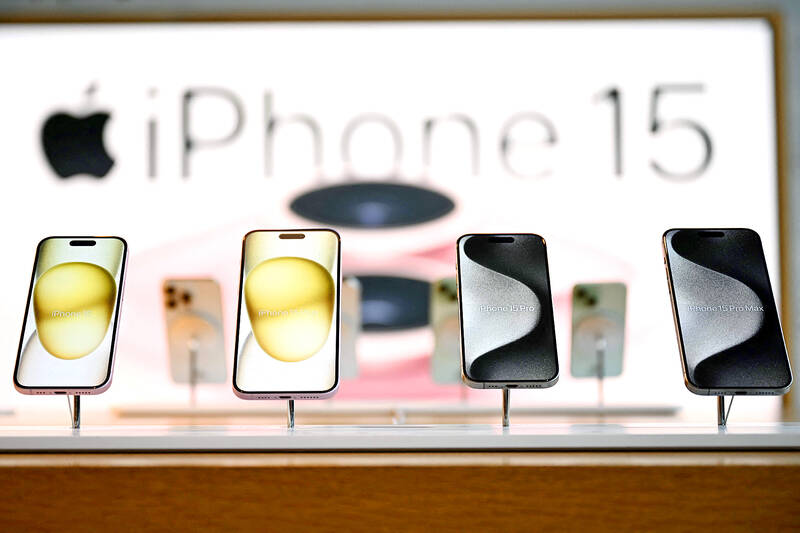Alphabet Inc’s Google Pixel is eroding the iPhone’s dominance in Japan as the Apple Inc device gets pricier, finding success after years of misfires.
Google phones accounted for a record 12 percent share in the Asian country in the June quarter, six times what it was a year ago, according to Counterpoint Research data. During the same period, the iPhone’s market share slumped by almost as much: to 46 percent from 58 percent a year earlier.
Japan is a key arena for the two Silicon Valley firms, as the world’s third-biggest economy and a huge market for mobile software and games. The iPhone has been as dominant there as at home in the US, and its decline this summer was the first time it commanded less than half the Japanese market in two years.

Photo: AFP
The plunging value of the yen pushed Apple to raise iPhone prices in Japan earlier than its recent global price hikes, and the cost of the device is proving a noticeable deterrent, at a time when the latest handsets have not offered must-have new features.
“Japanese users are becoming more pragmatic,” Counterpoint analyst Tom Kang said in an interview in Seoul. “There’s now more opportunity for alternatives. We’ve seen a little bit of growth in Sony and a little bit of growth in some other brands, but the growth of Google was most surprising.”
The yen’s weakness has also helped juice the Pixel’s sales. It makes the phone a bargain for consumers outside of Japan who want to buy the phone. The Pixel is offered in a limited number of countries and the yen’s slide toward its lowest level in more than three decades has made Japan the cheapest place to purchase the device.
“Japan is becoming the trans-shipment hub for Google Pixel devices,” Kang said. “So the iPhone is suffering from a weak yen and Google is benefiting from it.”
The sales drop in Japan highlights the challenges ahead for Apple. The company posted its third straight quarter of declining sales and predicted a similar performance in the current period, hurt by an industry-wide slump that has sapped demand for phones.
The release of Apple’s latest iPhone 15 series might give its market share a bump, although the starting price of the iPhone 15 Pro Max was raised by US$100 this year after eliminating a smaller storage tier offered in past years. Google is set to launch its latest Pixel device generation at an event on Wednesday next week.
“Price is becoming an important factor,” Kang said. “Loyalty for Apple and iOS is much higher than Android, I’d say. But Android devices always have the price advantage.”

TECH BOOST: New TSMC wafer fabs in Arizona are to dramatically improve US advanced chip production, a report by market research firm TrendForce said With Taiwan Semiconductor Manufacturing Co (TSMC, 台積電) pouring large funds into Arizona, the US is expected to see an improvement in its status to become the second-largest maker of advanced semiconductors in 2027, Taipei-based market researcher TrendForce Corp (集邦科技) said in a report last week. TrendForce estimates the US would account for a 21 percent share in the global advanced integrated circuit (IC) production market by 2027, sharply up from the current 9 percent, as TSMC is investing US$65 billion to build three wafer fabs in Arizona, the report said. TrendForce defined the advanced chipmaking processes as the 7-nanometer process or more

Who would not want a social media audience that grows without new content? During the three years she paused production of her short do-it-yourself (DIY) farmer’s lifestyle videos, Chinese vlogger Li Ziqi (李子柒), 34, has seen her YouTube subscribers increase to 20.2 million from about 14 million. While YouTube is banned in China, her fan base there — although not the size of YouTube’s MrBeast, who has 330 million subscribers — is close to 100 million across the country’s social media platforms Douyin (抖音), Sina Weibo (新浪微博) and Xiaohongshu (小紅書). When Li finally released new videos last week — ending what has

OPEN SCIENCE: International collaboration on math and science will persevere even if the incoming Trump administration imposes strict controls, Nvidia’s CEO said Nvidia Corp CEO Jensen Huang (黃仁勳) said on Saturday that global cooperation in technology would continue even if the incoming US administration imposes stricter export controls on advanced computing products. US president-elect Donald Trump, in his first term in office, imposed restrictions on the sale of US technology to China citing national security — a policy continued under US President Joe Biden. The curbs forced Nvidia, the world’s leading maker of chips used for artificial intelligence (AI) applications, to change its product lineup in China. The US chipmaking giant last week reported record-high quarterly revenue on the back of strong AI chip

Qualcomm Inc’s interest in pursuing an acquisition of Intel Corp has cooled, people familiar with the matter said, upending what would have likely been one of the largest technology deals of all time. The complexities associated with acquiring all of Intel has made a deal less attractive to Qualcomm, said some of the people, asking not to be identified discussing confidential matters. It is always possible Qualcomm looks at pieces of Intel instead or rekindles its interest later, they added. Representatives for Qualcomm and Intel declined to comment. Qualcomm made a preliminary approach to Intel on a possible takeover, Bloomberg News and other media